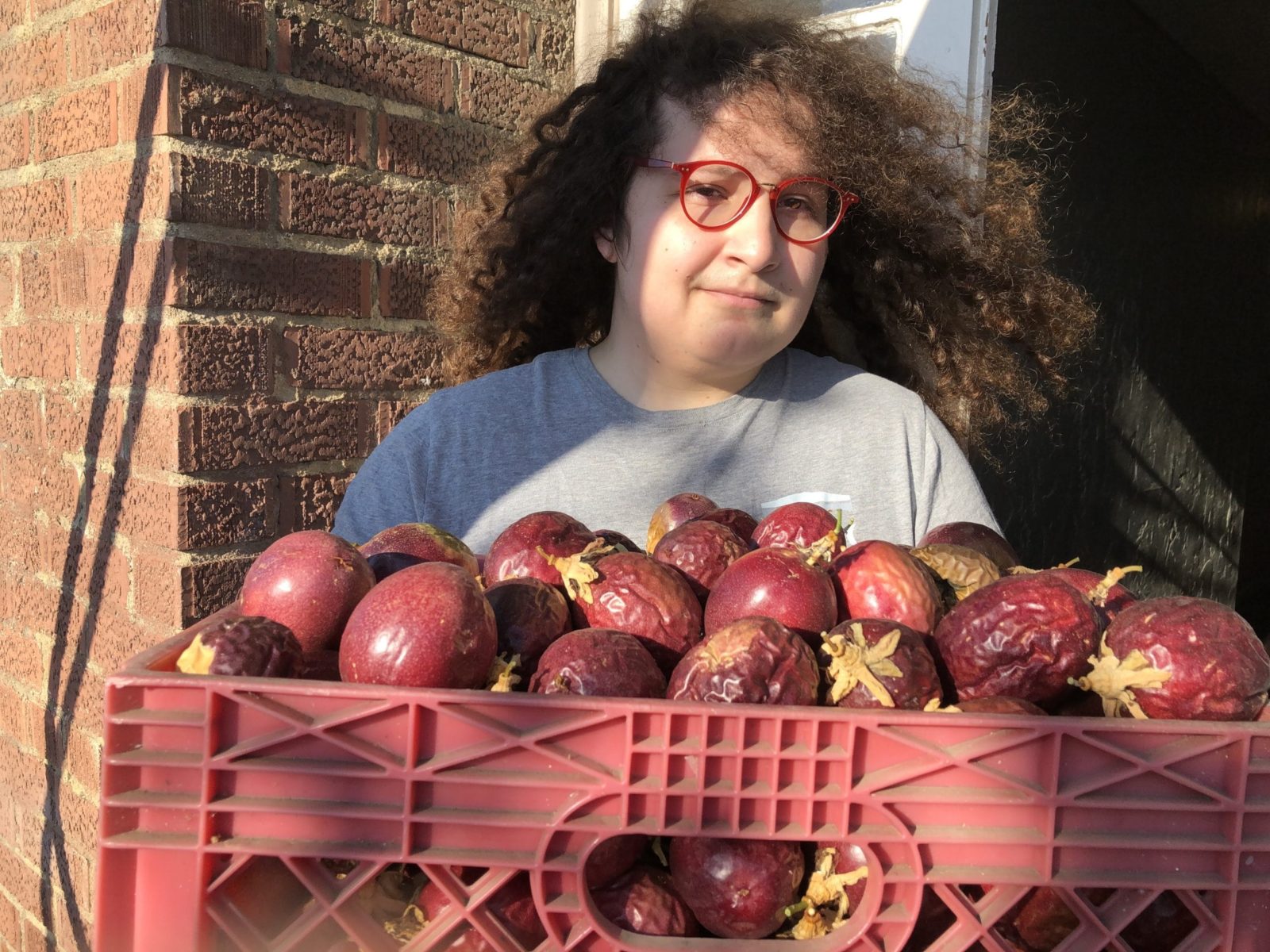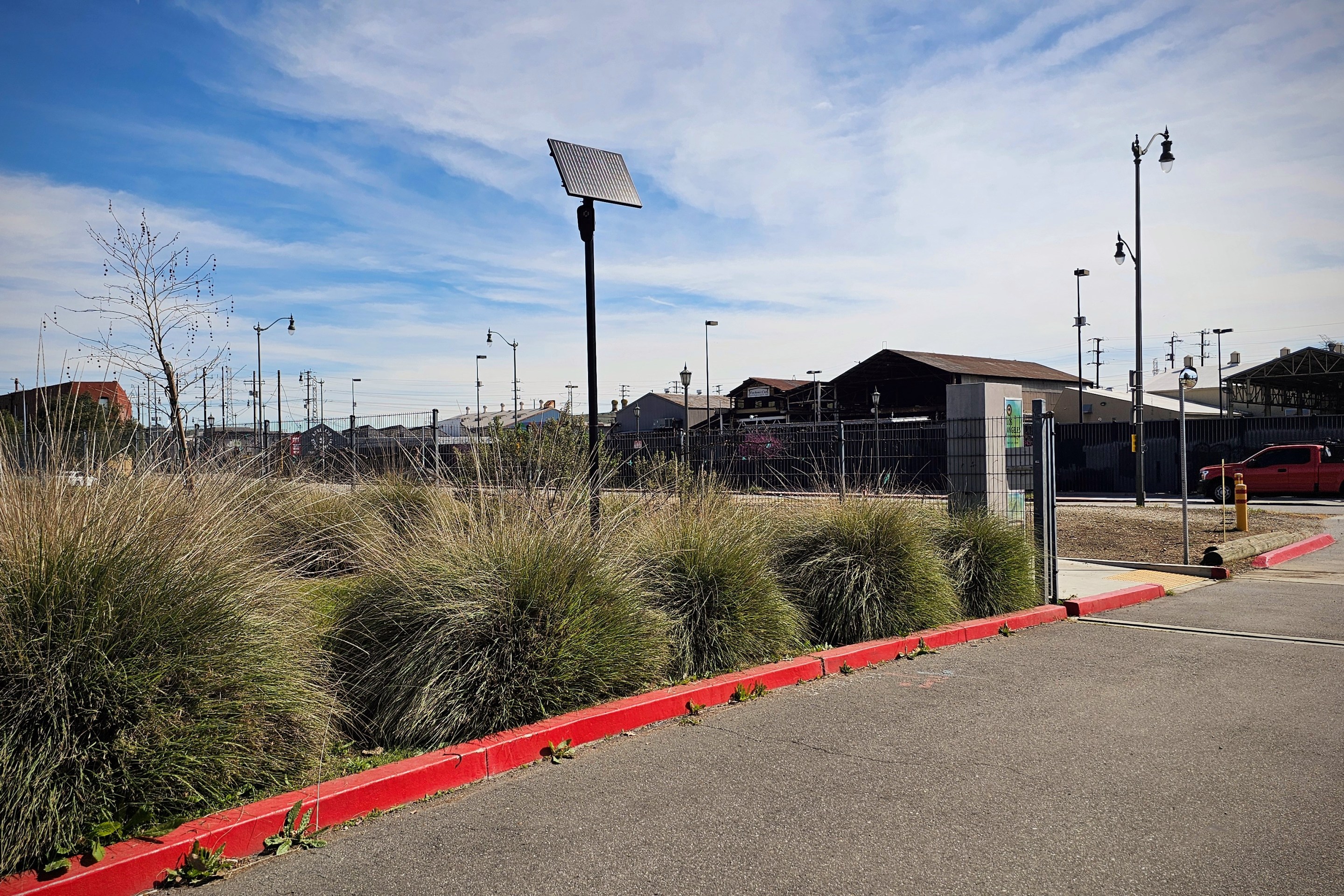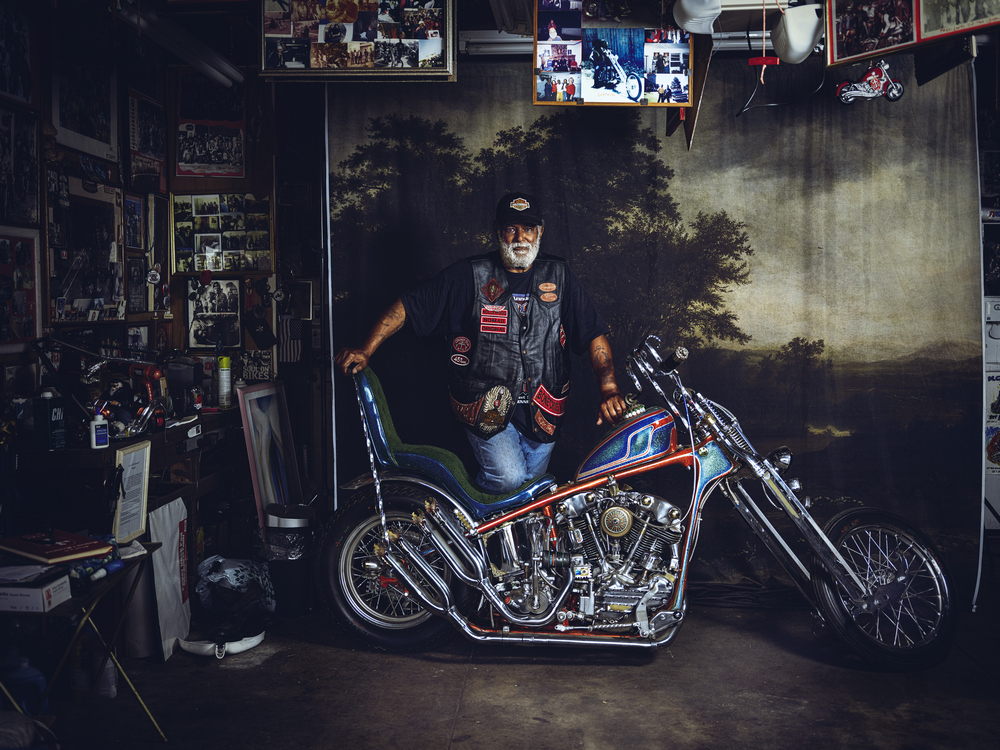[dropcap size=big]S[/dropcap]weet corn and squash blossom ice cream, white peach and sumac sorbet, passionfruit, and geranium frozen yogurt...these are just a handful of enticing flavors that Mercedes Saucedo is making out of her home in Arlington Heights. It used to be that you couldn’t obtain these chef-quality ice creams unless you were sitting at a nice restaurant, and you were approaching the end of your meal. Not to mention in the tiniest scoops, too, but thanks to Saucedo, who goes by @pulquemami on Instagram, not anymore.
She is a transgender Chicana chef who makes high-quality seasonal sorbets and ice cream to sell out of her home in the perpetual summer that is Los Angeles. Like many other foodservice professionals who were suddenly caught without work when the pandemic hit, she took matters into her own hands and focused on her passion for frozen desserts. She called the DIY take-out ice cream parlor and Casa Coco. She’s kept successful her up-and-coming concept low key until now.
However, even beyond this project’s necessity due to COVID-19, Casa Coco was a long time coming. As a transgender woman, Saucedo endured years of name-calling, catcalling, sexualized comments, and assault. L.A. Taco caught up with her to find out more about her resilient self, her cutting edge ice cream project, and her invaluable kitchen wisdom as a BIPOC chef.
L.A. Taco: How long have you been professionally cooking?
Mercedes Saucedo: I’ve worked in restaurant and production kitchens, across every position but leadership, for the past seven years approximately. It started after dropping out of college following a bad experience of grief caused by my brother’s death, and [cooking] become my main area of practice since then.
What restaurants have you worked at?
I’ve worked at several restaurants, but specifically, my most notable stretches were spent in Santa Ana at the 4th Street Market stalls conceived by Playground, at Nook Bistro on Santa Monica Boulevard, west of Sawtelle, at Steve Samson’s Sotto on Pico Boulevard, and at the Milk Bar Los Angeles flagship on Melrose by La Brea.
What got you into cooking?
I was raised in a single-mother household and learned cooking as a necessity when I was young, alongside my older brother, to keep ourselves fed while our mom worked. It was a lot of simple stuff: spaghetti, lasagna, mac and cheese, enchiladas, papas con chorizo on Sunday mornings.
The most special things were what we could get out of the overgrown and fertile backyard: old-growth Fuerte avocados from an enormous tree, a lemon verbena plant that crossed the border with my great grandmother and grew enormous, sour oranges, and tender nopales, a loquat tree dense with a yearly harvest for jam.
...name-calling, catcalling, sexualized comments, assault, and unconsented touching, degradation of skills, aggressive degendering of non-normative appearances, etc., all of which I’ve experienced in my time as an out trans woman in restaurant kitchens.
I always had a creative drive but never enough resources, time, and patience to teach myself an art; cooking at home provided an outlet. After I dropped out, the fond feeling and the sadness of distance from cooking catalyzed my decision to try for restaurants. The organized chaos of the kitchen proved a challenge that still excites me today. It’s an experiment that stuck!
Where were you born and raised?
I was born in Orange, technically, at St. Joseph’s Hospital, and after the divorce of my parents, we bounced around the county, but Santa Ana is where I grew and still the place I most consider home. When I was 10, we moved in with my abuela to her house on Riverside Drive in Santa Ana’s Floral Park neighborhood. It’s never been “working class,” but my abuelo and abuela managed to purchase a home and raise three children there as a union plumber and housewife.
The only reason I don’t still live there is as a result of an inheritance liquidation following my abuela’s passing that forced us to sell the house, effectively ending three generations of Saucedos in Santa Ana. If I ever were to become a homeowner again, I’d buy a place back in the city. I miss Sariñana’s and El Toro Market and Los Reyes Del Elote Asado, and throngs of people who look like family. Los Angeles gives me an approximation of that feeling, but home is home.
I read your post about the toxic environment that can exist in restaurant kitchens for trans people. What have you gone through and would like to bring more awareness to as a BIPOC chef?
Kitchen toxicity against trans people can be unique, but its most common manifestations are supremely recognizable within discussions of toxic workplaces in my experience and subsequent opinion. It’s recognizable as misogyny that looks much like cismisogyny: name-calling, catcalling, sexualized comments, assault, and unconsented touching, degradation of skills, aggressive degendering of non-normative appearances, etc., all of which I’ve experienced in my time as an out trans woman in restaurant kitchens.
What they all have in common is that cultures of fear and inequity enable them. I recognize this as someone who has a non-White, non-male, non-cishet experience. It’s all based on a kind of violent, repressive underestimation of the other.
In this one prep job, my native Oaxacan coworker died prematurely. I was promoted to solo prep at a pay raise of two dollars per hour and an unfulfilled promise to train me on the bread and dough portion of my late coworker’s job responsibility. What instead happened is that when I was made responsible for all general prep, and my CDC [Chef de Cuisine] would blame me for everything wrong with all prep in all stations, whether not I touched it. My confidence was so hampered that I would often take responsibility.
I made a point not to be out as trans in this kitchen, because of the boys club mentality amongst the leadership, between the CDC and his sous chefs, due to transmisogynistic and homophobic “banter” being a regular part of the kitchen culture. My emotional well-being could only take so much punishment.
I worked early off the clock; I never took a lunch; I was desperately chasing respect I would never receive. After months of this treatment, I quit in protest when my chef posted my entire job responsibility in a want ad on Craigslist after I dropped a blender jar. I made a point not to be out as trans in this kitchen, because of the boys club mentality amongst the leadership, between the CDC and his sous chefs, due to transmisogynistic and homophobic “banter” being a regular part of the kitchen culture. My emotional well-being could only take so much punishment.
My chef also hired a young White woman for one of the stations and constantly made passes at her (with the knowledge that she was engaged, and while he was married), provided her a level of individualized attention based on a presumption of total incompetence on her part, and subsequently spoke of how he trained her up from “knowing nothing” when she came on, despite leaving to start her own successful venture. It reeks of paternalism.
Contrast finally with the third woman in the kitchen in my time, a Black woman who cooked circles around all the boys in the kitchen stuck on one station and likewise strung along with promises of training that never manifested in favor of old buddies from chefs’ previous jobs. My chefs, presuming I couldn’t or wouldn’t hear, also made regular conversation of how they would continue to put pressure on her and downplay her skills to keep her in one place. I may not have been better in terms of plain skill than that kitchen, but she definitely is, and always was.
Remember that the modern kitchen line is based on the French military structure, a project of “hard“ colonial violence that caravans with the “soft” violence that empowers its hegemony: White supremacy, anti-Blackness, anti-indigeneity, colorism, manifest destiny, male supremacy, cisheteronormativity. Some of us have never had a real place there. I’m looking for somewhere else to be and become.
Remember that the modern kitchen line is based on the French military structure, a project of “hard“ colonial violence that caravans with the “soft” violence that empowers its hegemony: White supremacy, anti-Blackness, anti-indigeneity, colorism, manifest destiny, male supremacy, cisheteronormativity. Some of us have never had a real place there. I’m looking for somewhere else to be and become.
What is Casa Coco, and why did you start it?
The “why” is partially obvious, since I and all my coworkers and colleagues spend a lot of time supremely underemployed and underpaid. The “what” encompasses the rest of the “why:” Casa Coco is me filtering the joy of my experiences with food through the medium of ice cream. Experiences like strawberry shortcake Good Humor bars share time and space with sweet, fragrant lemon verbena that takes me back to the age of 12, as influential as the acquaintanceship with Californian farmer produce. I’m trying to invite everyone to that bygone backyard in Santa Ana.
I recently did a week of nothing but vegetable and herb flavors from my favorite farm, Chino Farm of Del Mar, in San Diego county. I get to be freeform, get to use the best of what I can get my hands on, and cultivate relationships with people who are as nuts as I am about both dessert and the best produce available. It’s small (just me, my wife, and my ice cream machine), but it makes me feel free.
What are some of your most popular flavors?
Every week I sell three flavors on a weekly rotation, and until recently, where I’m selling backstock from previous weeks to clear my freezer, I haven’t brought anything back. I do get questions though: When is fig leaf stracciatella gonna be back? How about french strawberry lemon verbena? Etc. I have strangers surprised at how much they liked avocado ice cream after trying mine as their first, which lights my heart up. I sell a lot of vegan flavors, since two of the three weekly selections are always vegan (one is nut milk-based, the other is a sorbet). People have been pretty happy to follow the trail but if this can ever turn into something bigger than just me in my kitchen, there’d definitely be a stable of repeats that people loved before.
What is your goal with Casa Coco?
The immediate future holds moving through the late summer into early fall in two phases: preserving this season and welcoming the early fall for its bounty. Peaches and stonefruit from Tennerelli, Scott, and Reiger Farms are out soon, as are strawberries, so jams and preserves for future flavors are on the docket, as are the bounties of the seasonal shift: rich grapes and figs, persimmons, and tropical fruits from the heat. My menus for the near and not-so-near futures are looking mighty exciting, and even in the market-light but still temperate L.A. winter, I can pivot fully into my pantry. Even with all the good stuff I’m buying, I haven’t lost money yet. All I’m looking to do for the duration of the pandemic to keep the ball rolling and maybe reach some more folks. It’s good stuff in the hands of farmers, and I’m doing my best to channel it.
The people who do the hardest work make the least money [in the restaurant industry]; if Casa Coco were to be something larger than it is now, it would be founded on upending that.
I shy away from infrastructural dreams, since so many of my problems with kitchens have to do with “supporting the kitchen” as opposed to supporting the workers. If it were ever to become something bigger, it’d be really particular! I’d do some of the typical pop-up upgrades (better equipment, a “brick-and-mortar” location that is appropriate and committed against the tide of gentrification) but most of my reckonings of what it could become have to do with changing the way restaurant work is done. Specifically, to me, it starts with horizontal wages, profit sharing, and prioritizing labor opportunities for non-White Trans people.
The chef gets to yell at you and abuse you because the ownership pays him two to three times more than you, and on salary, not hourly, which effectively means that he’s more important and less replaceable.
To ascribe disposability to labor is the primary evil of the moment, and doing away with it structurally, rather than with lip service, rather than with cultish “workplace-as-family” mentality, is the beginning of conquering that evil. The people who do the hardest work make the least money; if Casa Coco were to be something larger than it is now, it would be founded on upending that. With just me doing it on my own? It already is.
To order from Casa Coco, send @pulquemami a DM on Instagram.
This interview was edited for length and clarity.






